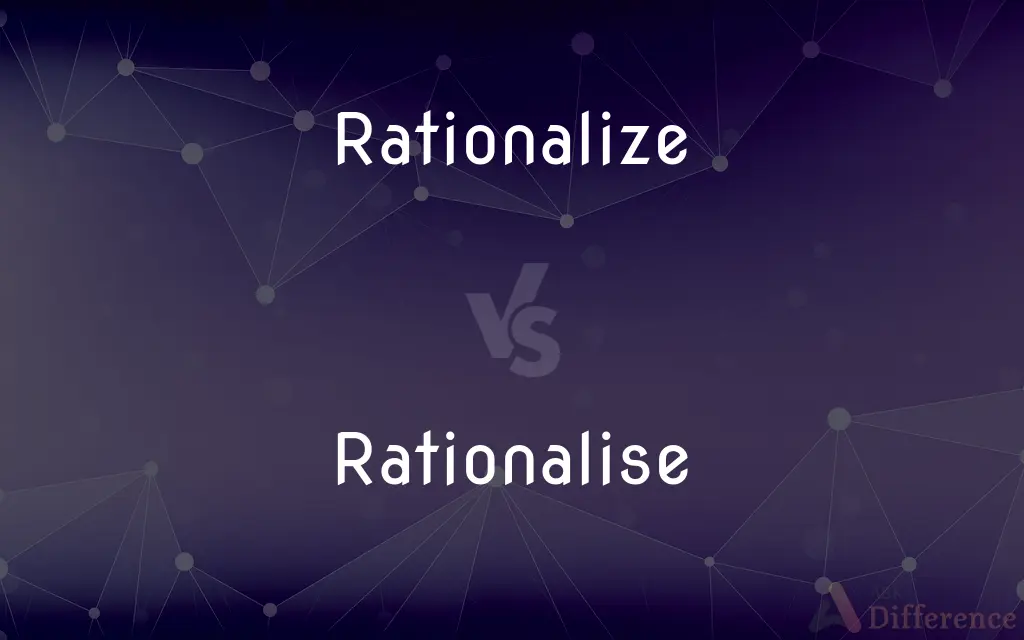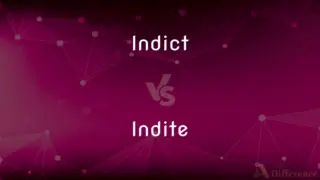Rationalize vs. Rationalise — What's the Difference?
Edited by Tayyaba Rehman — By Fiza Rafique — Updated on March 8, 2024
"Rationalize" and "rationalise" are variations of the same word, differing only in spelling; "rationalize" is preferred in American English, while "rationalise" is used in British English.

Difference Between Rationalize and Rationalise
Table of Contents
ADVERTISEMENT
Key Differences
The term "rationalize" involves explaining or justifying behavior or decisions with logical reasons, even if these were not the original motivations. It's a process of making something appear rational or reasonable. On the other hand, "rationalise" refers to the same concept but follows the British English spelling convention. Both terms signify the act of offering a rational explanation for actions that might not be rational at their core.
Individuals rationalize their actions, they often seek to align their behavior with socially acceptable standards by providing logical reasons. Similarly, when people rationalise, they are doing the same thing, just under the conventions of British spelling. The intent behind using either term is to make sense of decisions or actions that may initially seem illogical or driven by unconscious motivations.
In the context of psychology, rationalizing (or rationalising) is a defense mechanism wherein individuals justify their behavior to avoid confronting uncomfortable truths or cognitive dissonance. Whether one uses "rationalize" or "rationalise" largely depends on the regional linguistic practices, with the underlying psychological process remaining consistent.
The decision to use "rationalize" versus "rationalise" can also reflect adherence to different style guides or publishing standards, depending on the intended audience's location. For example, American publications favor "rationalize," while British ones prefer "rationalise."
Despite the spelling differences, the action of rationalizing/rationalising is universally understood in the English-speaking world. It illustrates how language can vary slightly yet remain comprehensible across different regions, emphasizing the importance of context in understanding and applying the correct variation.
ADVERTISEMENT
Comparison Chart
Spelling
American English spelling.
British English spelling.
Usage
Preferred in American English contexts.
Preferred in British English contexts.
Meaning
Justifying actions with logical reasons.
Justifying actions with logical reasons.
Psychological Context
Defense mechanism to justify behavior.
Defense mechanism to justify behavior.
Linguistic Preference
Used in the US and related territories.
Used in the UK, Commonwealth, and beyond.
Compare with Definitions
Rationalize
To attempt to explain or justify behavior with logical reasons.
He tried to rationalize his decision to move out.
Rationalise
To justify actions with logical reasons, often after the fact.
He sought to rationalise his abrupt departure.
Rationalize
Simplifying a process or system to make it more efficient.
The company decided to rationalize its operations to cut costs.
Rationalise
Streamlining processes to improve efficiency in a system.
The organisation aimed to rationalise its workflow to enhance productivity.
Rationalize
Making excuses for actions that might not be rational.
She rationalized her impulse purchase as a necessary investment.
Rationalise
Making adjustments to adhere to rational principles.
After the debate, she began to rationalise her stance.
Rationalize
Explaining irrational behavior with logic after the fact.
After the argument, he rationalized his outburst as stress-related.
Rationalise
Creating plausible explanations for impulsive decisions.
She rationalised buying the expensive dress as a long-term saving.
Rationalize
Adapting something to conform to principles of rationality.
He rationalized his beliefs in light of new evidence.
Rationalise
Providing logical reasoning for actions that seem illogical.
He rationalised his silence as a way to avoid conflict.
Rationalize
Attempt to explain or justify (behaviour or an attitude) with logical reasons, even if these are not appropriate
She couldn't rationalize her urge to return to the cottage
Rationalise
Standard spelling of rationalize
Rationalize
Make (a company, process, or industry) more efficient, especially by dispensing with superfluous personnel or equipment
If we rationalize production, will that mean redundancies?
Rationalise
Structure and run according to rational or scientific principles in order to achieve desired results;
We rationalized the factory's production and raised profits
Rationalize
Convert (a function or expression) to a rational form.
Rationalise
Defend, explain, clear away, or make excuses for by reasoning;
Rationalize the child's seemingly crazy behavior
He rationalized his lack of success
Rationalize
To explain rationally
“Philosophy ... is essentially the endeavor of the human mind to rationalize the universe” (Francis E. Abbot).
Rationalise
Think rationally; employ logic or reason;
When one wonders why one is doing certain things, one should rationalize
Rationalize
To attempt to justify (one's behavior) by providing reasons that obscure one's actual motives
Rationalized cheating on his taxes as being a form of political protest.
Rationalise
Remove irrational quantities from;
This function can be rationalized
Rationalize
To dismiss or minimize the significance of (something) by means of an explanation or excuse
“He could not rationalize the loss of some thirty thousand American lives in an unsuccessful war” (Robert Dallek).
Rationalise
Weed out unwanted or unnecessary things;
We had to lose weight, so we cut the sugar from our diet
Rationalize
To make (a business or process, for example) more efficient, as by reducing costs or introducing modern methods.
Rationalize
To terminate the employment of (workers) in an effort to improve efficiency.
Rationalize
(Mathematics) To remove radicals, such as from a denominator, without changing the value of (an expression) or roots of (an equation).
Rationalize
To think in a rational or rationalistic way.
Rationalize
To rationalize one's behavior.
Rationalize
To make something rational or more rational.
Rationalize
To justify an immoral act, or illogical behaviour. “The process of thought by which one justifies a discreditable act, and by which one offers to oneself and the world a better motive for one's action than the true motive”
Rationalize
(mathematics) To remove radicals, without changing the value of an expression or the roots of an equation.
Rationalize
To structure something along modern, efficient and systematic lines, or according to scientific principles. This often includes eliminating duplication and grouping like or similar items.
Rationalize
To make rational; also, to convert to rationalism.
Rationalize
To interpret in the manner of a rationalist.
Rationalize
To form a rational conception of.
Rationalize
To render rational; to free from radical signs or quantities.
Rationalize
To use, and rely on, reason in forming a theory, belief, etc., especially in matters of religion: to accord with the principles of rationalism.
Theodore . . . is justly considered the chief rationalizing doctor of antiquity.
Rationalize
Defend, explain, clear away, or make excuses for by reasoning;
Rationalize the child's seemingly crazy behavior
He rationalized his lack of success
Rationalize
Weed out unwanted or unnecessary things;
We had to lose weight, so we cut the sugar from our diet
Rationalize
Structure and run according to rational or scientific principles in order to achieve desired results;
We rationalized the factory's production and raised profits
Rationalize
Think rationally; employ logic or reason;
When one wonders why one is doing certain things, one should rationalize
Rationalize
Remove irrational quantities from;
This function can be rationalized
Common Curiosities
When should I use "rationalize" over "rationalise"?
Use "rationalize" for American audiences and "rationalise" for British or Commonwealth audiences.
How does rationalizing affect decision-making?
Rationalizing can skew perception and lead to biased or justificatory decision-making rather than objective evaluation.
Is there a difference in meaning between rationalize and rationalise?
No, they mean the same; the difference is purely in spelling.
Can rationalizing be considered a negative behavior?
It can be, especially if it serves as a way to avoid facing the truth or accepting responsibility.
Is it possible to stop rationalizing?
With self-awareness and effort, individuals can recognize and reduce their tendency to rationalize.
How does culture influence the tendency to rationalize?
Cultural norms and values can impact what behaviors are rationalized and the justification methods used.
Is rationalizing common in everyday life?
Yes, people often rationalize their choices to align them with societal norms or personal beliefs.
Can businesses also rationalize decisions?
Yes, businesses often rationalize decisions to align with strategic goals, sometimes at the expense of ethical considerations.
What's the difference between rationalizing and making excuses?
Rationalizing involves creating logical explanations, while making excuses may not necessarily involve logic and can be more about evasion.
Can rationalizing lead to cognitive dissonance?
Rationalizing is often a response to cognitive dissonance, attempting to resolve conflicting beliefs or actions.
Is rationalizing used in literature and art?
Yes, characters in literature and art often rationalize their actions as a reflection of human behavior, adding depth to narratives.
Can rationalizing affect relationships?
Yes, if one party frequently rationalizes their behavior, it can lead to misunderstandings and mistrust.
Is rationalizing ever beneficial?
In some cases, rationalizing can help individuals cope with difficult situations by providing psychological comfort.
How do children learn to rationalize?
Children learn to rationalize through observing elders and as a way to navigate social expectations.
Share Your Discovery

Previous Comparison
Bundle vs. Lot
Next Comparison
Indict vs. InditeAuthor Spotlight
Written by
Fiza RafiqueFiza Rafique is a skilled content writer at AskDifference.com, where she meticulously refines and enhances written pieces. Drawing from her vast editorial expertise, Fiza ensures clarity, accuracy, and precision in every article. Passionate about language, she continually seeks to elevate the quality of content for readers worldwide.
Edited by
Tayyaba RehmanTayyaba Rehman is a distinguished writer, currently serving as a primary contributor to askdifference.com. As a researcher in semantics and etymology, Tayyaba's passion for the complexity of languages and their distinctions has found a perfect home on the platform. Tayyaba delves into the intricacies of language, distinguishing between commonly confused words and phrases, thereby providing clarity for readers worldwide.















































